This is a story my mother told me, sitting by my bedside, on some Christmas Eve when i was a child. A nave story, with the charm and popular imagery of ancient tales.
I will share it with you: let us all recall those happy Christmas days when we were kidsHere it is:
Once upon a time, in the French province of Alsace, there was a little orphan boy. He lived with his mother in a shack, they were so poor! And she was so sick and weak, he had to earn every cent of their living.
He worked as hard as he could, picking up flowers in the meadows and selling them in springtime, helping the landlords with crop- and vine-harvest during Summer and Fall, but when winter came, there was no more work in the farms, and no more fruits to pick in the orchards and bushes.
They starved.
That year, as Christmas drew near, his only dream was to offer a cake for his Mother to eat on the Holy Night, but they were broke. On Christmas Eve, he suddenly had an idea: he would walk to the woods, and grab one or two evergreens, to sell them as Christmas trees, and with the money, buy a cake.
So he walked out in the cold, under the snowstorm: his shoes, full of holes, filled up with snow, and his feet were freezing. He had no gloves, and could not feel his fingertips. Once in the woods, he realized he had no axe nor strength to cut the trees or branches. All he could do was to unroot two ridiculously small and miserable fir tree saplings.
Dragging them behind him in the snow, into the village, he knocked at the first door: Bonjour! Would you buy a Christmas Tree from me, Sir ?. Without a word, the man slammed the door closed.
The boy went to the next house: Bonjour, Monsieur, would you buy a Christmas Tree from me ?
The peasant stared at the tiny saplings and laughed at him.
The following house belonged to a widow, who patted him gently on the head, saying: I alreadyhave one, my dear, come back next year.
And this went on and on, all through the village, and the little boy had a big lump in his throat. Finally, he reached the last house, the big mansion of the main landlord in the country: he owned farms, fields, forests and vineyards. After knocking once again, when he saw, framed in the door, the shadow of this big man in velvet jacket and smoking a pipe, the little boy could not utter one word.
Bonjour, mon garon ! What brings you here? But dont stay out in the cold, come in!
The orphan entered the main room. He had never seen such a beautiful and large place in his life: thick carpets, a huge fireplace where the fire was joyously crackling, richly decorated walls, high, oh- so- high ceilings.and in the middle of the room stood the Master of all Christmas Trees, a tall fir tree, all girdled and lit with candles, the most wondrous thing!
Sensing his last chance to sell his miserable saplings was gone, the boy burst into tears, he could not hold them any longer.
Now, Hush, my boywipe away your tears, and tell me whats the matter said the man in the velvet jacket, and the little boy told his story.
The landlord, puffing his pipe, smiled and said: Could you show me your trees?...oh! they look quite interesting! Really! Of course, they are like baby trees, I could not use them as Christmas trees this year, but they seem quite promisingyes, I am interested, I might plant them somewhere , and when they are grown up, I have the feeling that they might be the most beautiful fir trees!
After a while, he added: Would you accept to sell them to me, as a favor?. He searched in his waistcoat pocket, and handed the boy a coin. A gold coin! Un Louis dOr!
The orphan could not believe it. With bulging eyes he stared at the coin, turning it around between his fingers. He could only mumble: Oh good Lord! Thank you, Monsieur, thank you so much, God bless you!.
The landlord, still puffing his pipe, wore a bright smile on his face, as he watched the child running back to the village, to buy food and bring it home. His smile disappeared when he saw the two tiny fir trees the boy had left on the floor. He was about to throw them away, but then he thought again: No, I could not lie to a poor orphan boy on a Holy Day like this: I told him I would plant the trees, so I will . He stepped out with a shovel and a spade, headed to the hamlets chapel, and planted the trees behind hedges , one on each side of the church. He knew all along it was not a good season to plant trees, but he had promised.
Later that night, everybody in the village had a wonderful family dinner, including the poor orphan and his mother. When these two finished their last meal ( a deliciously creamy cake!), the little boy asked his Mom if she felt restored and sound enough to attend the Midnight Mass with him. She nodded and off they went.
It was not snowing anymore, the night was dark and shiny, and even the stars seemed to glow with happiness. From all the roads leading to the hamlet, all the families of the surroundings were gathering slowly and silently towards the church. As this assembly got nearer to it, and before they could see it, they heard in the distance a mysterious and heavenly music. They followed the sounds and when they arrived in front of the chapel, they could not believe their eyes, and some of them even fell on their knees.
On each side of the little church, two huge fir trees no one had ever seen before had grown taller than the steeple, and on top of them angels of light were swaying in the flow of celestial music.
I remind you that we will keep track of the results of Tournaments organized in the Royal Courts with the support of our Fencing Group: Points will be awarded to contestants, and by the end of the season, the Title of Royal Courts Fencer of the Year will be granted to the fencer who scored more points, with a bonus prize of 3000L$.
Points will be granted in each tournament this way:
-1 point for a defeat (Thank you for comingJ)
- 2 points for a victory
- 3 points for the finalist
- 5 points for the winner
After the Orange Nassau and Coeur Tournaments, the rankings are:
1/ Myron Verne, 16 points (just here for honour and entertainment, I am outside the prize competition)
2/ Hera Poliatevska(Sophie Dalville), 10 points
3/ Joesf Fitzpatrick, 9 points
4/ Maria Louisa Muircastle, 7 points
5/ Paco Gothly, 6 points
6/ Elisabeth Milneaux, Susanah Tigerpaw, Myron Byron, 3 points
7/ Tatiana Dokuchic Varriale, Pekel Panacek, 2 points
8/ Selina Vayandar, Marie-Therese ( Glendevon), Bedrich Panacek, Trasgo Beaumont, Roy100 Allen, 1 point.
Conclusion: the way the points are granted, there is a little premium to those who attend many tournaments, BUT not a big premium between a loser in the first round and the winner of the day, so the ranking can change really fast!...added to the fact that luck often makes the difference, you, as well as new fencers, are invited to join the next competiton, which will be held in Melioria soon! Check your calendar of events!
Please, remember and meditate the very true sentence uttered by Joesf Fitzpatrick after a defeat: No matter how good you are, this En Garde! game has its way to keep you humble!
He meant any champion of this game may be sometimes beaten by anyone simply mastering the basic rules, since luck might make the differenceso forget your fears or inhibitions if any, try your luck, enjoyand win!
Royal Courts Ladies and Gentlemen who could not attend this Tournament certainly missed a lot! I want to thank all fencers and the audience, who came from Venezia, Versailles, Spain and Coeur, and helped in making this event such a happy and enjoyable one!
Here are the results:
First Round :
1/Elisabeth Milneaux defeats Selina Vayandar, Contessa di Loredan (in a very close and talkative duel, but so funny, lively and skilled !)
2/ Joesf Fitzpatrick d. Marie-Therese ( Glendevon) , who was unlucky to have him -presently n 4 in the En Garde! World rankings- as an opponent in the first round)
3/ Maria Louisa Muircastle , Baronne de Coeur d. Bedrich Panacek, Duc de Cur
4/ Captain Paco Gothly, from the Spanish Court d. Hera Poliatevska( aka Sophie Dalville) formerly winner of the Orange-Nassau fencing Tournament.
5/Myron Byron, Conte di Loredan, d. Tatiana Dokuchic Varriale, Duchesse de Provence,( he scored the last touch at 4-4, so thrilling for the winner, so frustrating for the opponent!)
6/Myron Verne, Baron de Cur, is merciless and defeats his dear friend Dr Pekel Panacek, Baron de Touraine ( one more 5-4 score!)
Second round:
1/ MariaLouisa Muircastle d. Elisabeth Milneaux
2/ Joesf Fitzpatrick d. Myron Byron, one of the Venetian and Versailles stars of fencing
3/ Myron Verne d. Paco Gothly (One more last touch at 4-4 victory)
Final:
So, consequently to the number of contestants, we have three finalists instead of two! It is decided to have two finals, one for the prize, and one for honourJ
In the first final, Maria Louisa Muircastle held the score until 3-3, but finally Joesf Fitzpatrick scored the last two points and won.
Thanks to the donation of The Duke and Duchess of Coeur, and an additional generous donation from his Excellency Il Principe di Melioria, Joesf was awarded the 2000 L$ prize, and Maria Louisa a finalist prize of 1000L$.
In the second final, Myron Verne, Baron de Coeur, with lots of luck and maybe because former competitors had exhausted his opponent J, defeated Joesf Fitzpatrick.
My very special thanks to Duc Bedrich , who prepared the pistes, and encouraged me from the start, Maria Louisa Muircastle, who provided the refreshments and food on the tables near the pistes, and of course my dear Lady Candace, without whose help and assistance nothing would be possible.
There will be more Tournaments to come: The Royal Courts Fencing Group will support all Courts who organize them. So keep an eye on the events Calendar and the Fencing Group messages and Join the Fencing Fun!
SIDE STORIES, ANECDOTES AND CHARACTERS, Part Two-Footnotes to the True Story of La Maupin
By Lord Myron de Verne, 2010-11-06
(1) If I novelized this true story a little bit, hopefully for your reading enjoyment, I did not invent the facts : they are documented, scattered in different books about history of music, history of fencing, or history of amazons and out of ordinary women, by such specialized authors as Letainturier-Fradin, Fetis, Campardon, Colombey, Gilbert, Salmonsona brilliant synthesis of these scattered pieces was made by Jim Burroughs, on the web.
Mademoiselle de Maupin is also a 19th century book by French writer and romantique Thophile Gautier, which , except for the title, and a few fencing and cross dressing sections, bears no resemblance whatsoever with the life of this astounding and scandalous woman.
(2) WOMEN AND FENCING
During the 17th century suddenly appeared some fencing or dueling women. Not many of course, but as this had never existed before, it was all the more striking. Gilbert writes: Duels between women became a more common event towards the end of Louis XIV reign. Archives state, for instance, that one woman wrote to another: I reverse the natural order of things, and opposing to women s established custom, I let you know that I stand in your back street right now, sword in hand, in order to fight with you for ownership of my dear Philemon.
J.A. Salmonson also writes:In the 1600s, swordswomen were considered as an unusual but eventual occurrence; people would pay to attend their duels, just as they would have paid to see a dancing bear ( charming comparison!)
Why did it all begin in the second part of 17th century? Was it a more opened society, allowing a broader place to women and having a new look on how they should behave or not? Maybe a little( but very little). In my opinion, the main reason was something else.
In those days, a new kind of sword, the foil, was invented: it was much, much lighter and thinner than former rapiers, and therefore easier to handle. The foil was also a thrust only type of weapon, as opposed to cut and thrust blades of ancient times. The foil blade was a bit flexible, and quadrangular of triangular in shape, with no cutting edge. The pointe, or thrusting extremity, could be covered by a button, in order to avoid severe wounds during trainings or duels. Even more important than this novelty: a new and different technique of fencing was needed to adapt to this new weapon. It caused the development of the French Style of fencing( lEcole Franaise).
This new French Style, born with the foil, instead of putting the emphasis on strength and violence, insisted on dexterity, visual accuracy, timing, speed and precision in gestures and moves, a rational approach to the different attacks, parries and ripostes, and, finally, on elegance, virtuosity and panache .
No more frightful cuts, slaps and slashes with the cutting edges, most of the times no more piercing the opponent from side to side, but only some sort of competitive art form with a weapon. Some even compared this new style to a dance adapted to its special fighting aim. I read that some salles darmes, therefore, added the teaching of dancing to the teaching of fencing. What was formerly reserved to men to prepare them for war combats, became more of a social ritual, a forerunner of todays sports.
These two changes ( foil, French Style) made fencing more accessible to women with a feeling for adventure, and made them more acceptable in this formerly for men only world.
The moves and gestures in SL En Garde! are obviously derivative from this foil technique.
(3) BANNING THE DUELS
In the 1600s, duels of honor between Nobles had become a social nuisance, thousands of young noble gentlemen being killed or becoming disabled The Cardinal de Richelieu, Louis XIII Prime Minister, banned dueling by a state decree, to protect the elite of the countrys youth.
Those who infringed the rule could be sentenced to a dishonorable death if they had killed their opponent, or to jail if they only wounded them.
This banning decree was not applied strictly, but renewed with more details many times under the following reigns of Louis XIV, Louis XV and Louis XVI. It did not stop completely the duels of honor habit, which was so strongly rooted in the morals of the Nobility.
( See for instance the duel of honor at the beginning of Alexandre Dumas The Three Musketeers, where dArtagnan, Athos, Porthos and Aramis, the three Musketeers, are interrupted by the Guards of Cardinal de Richelieu, who try to arrest the Musketeers for infringing the ban.)
This relative inefficiency of the ban caused the political power to encourage and sometimes sponsor the salles darmes, where fencing could be practiced and enjoyed with no danger.
(4) MADEMOISELLES ON STAGE
In those days, actresses and female Opera singers were called Mademoiselle, whatever their age, and whether they were married or not. Mademoiselle de Maupin is a good example. The reason for this is that actresses and singers, if they were admired for their artistry on stage, were considered in everyday life, notably by the allmighty Church, as evil persons ,or at least doing an evil job. They therefore could not be granted the dignity of a Madame. Usually, after their death, the church refused them a mass before their burial.
Even if the connotation of Evil disappeared with the times, notably by the end of the 19th century, the habit of calling actresses and singers Mademoiselle, even if they were 80 years old with legions of grand-children, remained in France until recent years.
(5) MADEMOISELLE DE MAUPIN A LOPERA
Mademoiselle de Maupin was a true star of the Acadmie Royale de Musique, as the Opera, located in the Paris Palais-Royal, was called then. Latainturier-Fradin and Campardon inventoried 30 plays in which she performed in Paris, and we should add those she sung in Brussels, maybe 5 or 6 of them.
In those days, as far as stage music was concerned, there was a competition between French and Italian styles. The Italian Operas focused on the melody and vocal solo prowess of singers, when the French style was, according to the taste of the Royal Court, trying to achieve a total show, blending music (strongly based on harmony rather than melody), singing ( solo and choirs) and a lot of dancing, with the frequent use of machines ( scenic equipments allowing the actors to fly over the stage, or simulating clouds, thunders, fire, and so on.)
The main style of French Opera was the Lyrical Tragedy: a prologue, and usually 5 acts or Entres (The Italian Opera was usually in three acts). The subjects, as in Theater tragedies of the same time by Corneille or Racine, were drawn from Roman or Greek antiquity and Mythology. A variant came later, called the Heroic Pastorales, where the main characters were idyllic peasants in love, drawn from the antique mythology.
The greatest exponent of the lyrical tragedy was Jean-Baptiste Lully, who created it, and to a lesser degree, Andr Campra. Many other composers existed though, whose works are reputed less interesting. Under the reign of Louis XV, this style became out of fashion, in spite of the tenacious efforts of Jean-Philippe Rameau, the best of them all.
Simultaneously, another style of stage music was also favored in France, the OPERA-BALLET.
Invented by Colasse, a disciple of Lully, it was bettered by Campra ( in LEurope Galante) and brought to its final perfection by Rameau in Les Indes Galantes.
It was not built around a story, but was rather a sequence of scenes in a lighter vein, loosely assembled on a vague theme, each scene being whether sung or danced, full of variety and imagination.
For those interested, I may advice the DVD of Lullys lyrical tragedy Cadmus and Hermione by Herv Dumeste and Le Poeme Harmonique, a splendid rendition following as strictly as possible the original style ( I have posted a video of an extract with English subtitles-even Frenchmen have difficulties in understanding the old-stylish way the lyrics are worded!) This Cadmus and Hermione was the first work in which La Maupin sung in Paris in 1690.
I may add the charming Opra-Ballet Les Indes Galantes by Rameau, directed by Willliam Christie and his Arts Florissants , a lively and true to original musical version, in a semi-modernized and enthusiastic scenography.
SIDE STORIES, ANECDOTES AND CHARACTERS, Part Two-THE TRUE STORY OF LA MAUPIN, Last Chapter
By Lord Myron de Verne, 2010-11-06
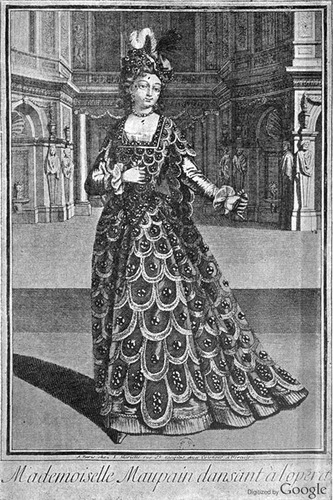
Chapter Three:
For her debut in the Paris Opera company, Mademoiselle de Maupin is featured as the Grecian Goddess Pallas in the casting of Cadmus and Hermione, a lyrical tragedy composed by Lully on lyrics of Quinault.
Julie appears, standing motionless in a flying white carriage, which is slowly lowered by mechanics from the gridiron near the rooftop, down to the stage. She wears a white toga and Greek silver helmet, and holds a silver bow and arrow. Landing onstage, she steps out solemnly, and walks towards the audience, in pace with the music. Like a living statue, she doffs her helmet and , graciously shaking her head, has a wave of liquid, curly, auburn hair cascading to her shoulders, like a waterfall, as she begins to sing a divine aria.
The audience is immediately under her spell. She steals the show. Next morning, she becomes the talk of the town: a star is born! And she will spice up this sweet smell of success, as stars ought to, with an unprecedented string of scandals!
Its always the same with her: she feels attracted to someone, exercises her seduction, falls in love, creates drama, quarrels, gets bored, meets another personand starts all over again!
She makes Thevenard jealous, by having affairs with men and women of the company, among them Marthe Le Rochois, the undisputed lead singer, addicted to feature roles.

She has enemies, too: Dumesnil, a former cook and a haute-contre singer( mens high-pitched voice) is a dull and rude braggart infatuated with himself, who spends his time behind the scenes trying to kiss and grope the actresses. She hates him. One day he makes advances towards her, she rebuffs him; as he insults her, she promises to revenge.
A few nights later, she dresses as a man, and in the dark streets of Paris ( recently invented city lights are scarce), waits for Dumesnil as he comes back to his home. He does not recognize her in the dark. She challenges him to a duel. Sweating and stuttering for fear, he refuses. Then she hits him several times with the guard and pommel of her sword, and steals from him his pocket watch and his golden tobacco box.
The next day, Dumesnil meets the company in the Opera House. He has a black eye and many bruises. He explains he has been attacked by three armed thieves, who stole his watch and golden box. Triumphantly, La Maupin shouts You liar! You coward! It was not three thieves, it was me, and me alone! and throws him the watch and box. She ridiculed him, and she has one more enemy forever.
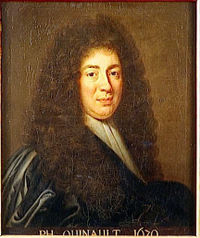
At the same time, she goes on training her fencing, and spends a lot of time in salles darmes , when she is not singing. Fencing, before this time, was strictly reserved to men. Times are changing, and some fencing women begin to be known, but none of them has the skills of Mademoiselle de Maupin. Only the best of men can beat her. Her renown in this other field spreads throughout Paris and Versailles.
Monsieur , as is called Louis XIV brother, le Duc dOrlans, patrons a grand ball in his Palace in the Marais quarter of Paris, which the King will attend, along with hundreds of other guests. Mademoiselle de Maupin is now so famous, she is also invited.
Against all odds, she dares to appear in the most luxurious mans attire of brocade, with a foil to her hip! Seeing in this noble crowd a charming young lady chatting with three gentlemen, she invites her to dance and becomes flirtatious. The three young nobles are infuriated, and they try to stop Julie. They go out in the gardens, and she fences against the three of them together, and defeats them! The Palace guard gets hold of her, and she is brought to Monsieur, just as the King approaches his brother. He is explained what happened just before.
So you are La Maupin the Jade! I heard about your deeds and accomplishments . Do you ignore my decree banning duels?, His Majesty says. She curtsies and mumbles words of apology.
For two days , she lives in anxiety ( what will the King decide?) until she learns the King finally considers his decree forbade duels for MEN, with no mention of WOMEN: as she is an isolated case, he does not sue her. But as the royal reprimand has made her cautious, she keeps quiet for some time.
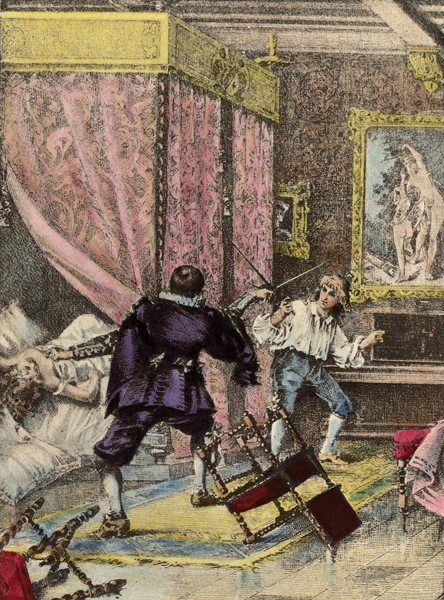
Later, she seduces a married woman, and they are surprised by the husband coming home unexpectedly. He wants to strike them, she defends herself with her sword, they fence, and she wounds him. This time, she is really scared by the possible consequences, and flees to Brussels( but the husband does not complain to Police nor Justice, to hide his misfortune).
Being abroad in Brussels, under Spanish government then, she feels safer, and is hired there in the Opera du Quai au Foin, where she stars in several works of Lully. She has a liaison with the Elector of Bavaria, who has been nominated Governor of the Spanish Netherlands by the Holy Emperor. The Elector soon wants to leave her for a beautiful Comtesse. He asks to the latters husband, the Comte, to deliver to Julie a purse full of a fortune in gold coins, to signify their estrangement and soothe it.
La Maupin, in anger, throws the purse back to the face of the Comte, shouting: Keep this change money, its only good enough for a cuckold like you!.
She comes back to Paris, and its Opera House. As Mademoiselle Le Rochois retired, La Maupin now alternates with Fanchon Moreau and Mademoiselle Desmartins in feature roles. These are the heydays of her singing career. Andr Campra, one of the leading French composers, having in mind her unique and uncanny voice, writes especially for Mademoiselle de Maupin the part of Clorinde in his lyrical tragedy Tancrede .
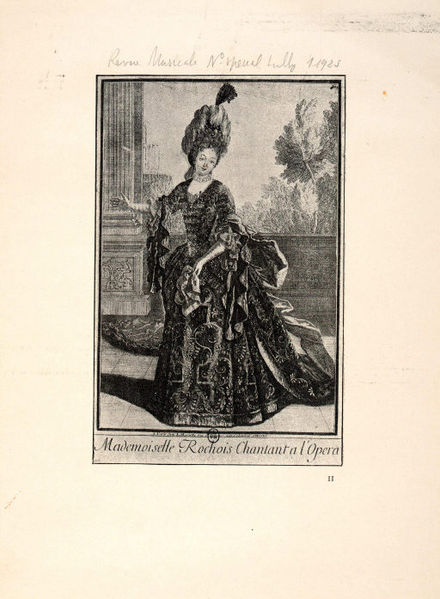
She falls in love once again, and as her love is not shared, she pretends, to no avail, to commit suicide. During her recovery, she is helped and assisted by Marie-Thrse de Senecterre, Marquise de Florensac, reputed as la plus belle femme peut-tre qui fut en France( Saint-Simon, in his Memoirs) and the gentlest, sweetest and most simple in her beauty. They become close, but chaste , friends, enjoying the sweetness of sincere friendship between young ladies sharing love of life, art, conversation and gigglesbut suddenly, ill fate strikes again: within two days, Madame de Florensac dies, leaving Mademoiselle de Maupin alone again, loveless, friendless and desperate.
Julie, for the first time in her life, becomes tired, so very tiredShe looks around , and sees no one to turn to: DArmagnac is old and sick, Luynes is married and lives abroad, Srannes is dead, Thevenard is penniless and drowns his failures in alcohol
Is it because she senses death is drawing near? Because she feels remorse for her scandalous past and her life in turmoil? Because she cannot stand anymore to be considered an outcast in this formal and rigid century?...or because, the impulses of young age fading away with her youth, she searches for a deeper meaning to her existence? Who knows? Anyhow, she becomes more and more religious: a rosary adorns her hand which once held the sword, and her lips, which worded profane songs, now murmur prayers for salvation. She intends to retire into a nunnery, but is rejected
Crushed by loneliness, she finally turns to her husband, Maupin: he accepts to come back to her. She gives up fencing. She gives up passions and adventures. Soon she will give up singingdrop by drop, life is drained out of her. We ought to imagine Julie, staying at home in her armchair, looking out the window, waiting for Maupin, as the day ends and darkness fills the street
Did she find peace at last? Is this the sad ending of a frantically adventurous life of fun, or the happy and serene ending to a comedy of errors, mistakes and scandals?
Maybe you can tell : mais moi, je ne sais pas . Each and every life is a mystery.
This aging Lady dies in 1707. She is not 37 years old yet.
THE END.
Pictures, from top to bottom:
(1) Mademoiselle de Maupin on stage at the Paris Opera House
(2) Jean-Baptiste Lully
(3) Philippe Quinault
(4) La Maupin duelling with her lover's husband...
(5) Marthe Le Rochois, first singing star of the French Opera
SIDE STORIES, ANECDOTES AND CHARACTERS, Part Two- THE TRUE STORY of LA MAUPIN, Chapter Two
By Lord Myron de Verne, 2010-11-03
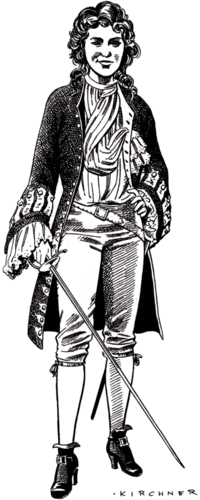
Chapter Two:
By now, La Maupin is described as a beauty in full bloom, tall, statuesque athletic body, haughty bearing, long auburn curly hair with golden reflections, the fairest skin, blue eyes, slightly aquiline nose, exquisite luscious lips and perfect breastsShe still does not seem to be granted feature roles in Marseilles Opera House, and probably continues her act with Srannes at the same time.
But soon, she gets tired of her lover: is it because he no longer fits her new lifestyle? Or because she now becomes bored with men in general, feeling new attractions?
She has an affair with a young noble girl, who is seduced by this dominant and overwhelming amazon.
After three passionate months together, the young girls family discovers the truth, and, fearing scandal, sends her to a nunnery in Avignon, 60 miles north of Marseilles. La Maupin is infuriated, she cannot stand to be antagonized nor resisted.
She knocks at the convents door , meets the Superior Sister, and pretends she wants to join the community as a novice (actually desiring to meet her dear girlfriend again). She plots an horrendous stratagem to escape with her.
One night she digs a dead nun out of the nunnerys graveyard, and lays the corpse in her friends bed. She sets the convent on fire, to cause distraction, and they both get away.
Hand in hand, they run for cover to the woods nearby, hearing behind them the eerie howls of the fire and the tragic crackling sounds of the convents burning woodwork and carpentry. When they reach the forests edge, they stop and look back to see the huge flames crowning the building like a devilish Medusas hair of fire: the young girl is in tears, and La Maupins face beams with an evil grin.
Such an outrage! Julie dAubigny La Maupin is put on trial , in absentia , by the Provence Parliament in Aix. For the motives of abducting the young girl, unearthing the buried corpse, and burning the religious buildings, she is sentenced to death on the bonfire, the usual punishment for crimes against religion.
Meanwhile, she and her friend hide and live like outlaws, in poverty. The young girl, out of guilt and shame, eventually returns to her family, but Julie cant go back: she has a death sentence pending. She heads to Paris, zig-zagging her way North, East and West.
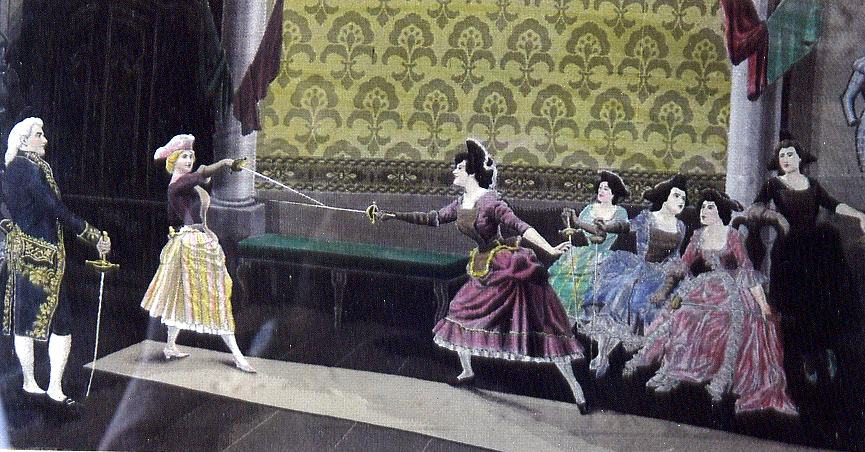
Orlans : She sings and fences in taverns again.
Poitiers : She is hosted by an old singing Master ( and drunkard), Marechal, who perfects her vocal technique, says her future in Opera is bright, and gives her a recommendation letter for a friend of his in Paris, a theater director.
Tours : She enters a tavern in her mans attire, wearing a long cloak, holding her foil by her hip. Next to her table, four young aristocrats are drinking. They begin to tease her, and she answers in her daredevil usual way. Their leader persists, and as she stands up to leave the room to avoid a quarrel, he grabs her by the wrist to keep her standing still. Thats too much!
She unsheathes her sword and threatens him, he laughs, and they fight. After a few attacks, parries and ripostes , she pins him between chest and shoulder, and the iron pierces through, protruding ten inches out of his back. He turns his head over his shoulder and sees the blade tainted with his own blood. Big silence in the tavern. All jaws drop. She withdraws her foil, and walks out like a queen.
This young wounded man is named Louis Joseph dAlbert de Luynes, heir to the Duc de Luynes, one of the highest and oldest noble families of France. A surgeon comes to clean and bandage his wound, but Luynes tears off these bandages: he wants this woman to change them! One of his friends finds La Maupin in the nearest inn. He explains that Luynes apologizes for his behavior, and how he needs her to help in his recovery. She says she will come with her answer later.
In the middle of the night, she creeps into dAlberts room, and letting her mans cloak fall to the ground, she appears to him in a feminine tulle negligee She heals him beyond his expectations.
They become passionate lovers, but soon dAlbert has to rejoin his Army Regiment. Their affair will continue intermittently, until his wedding, some years later.
Alone again, Julie still cant decide whether or not to go to Paris. Too dangerous. Now we find her in Rouen , singing again. She meets an Opera singer named Thvenard, who falls in love with her, and convinces her to try their luck in Paris.
When they reach the capital town, she first addresses her former lover, le Comte dArmagnac, and asks him to plead her cause to the King. In remembrance of their past, this he does. Louis XIV, to please his cousin, pardons and cancels the death sentence of the Aix Parliament.
Free at last!
Thevenard is hired in the Paris Opera House, as is La Maupin, soon afterwards, with her letter of recommendation. She has lived several lives to the fullest, yet she is only twenty years old!
( to be continued)
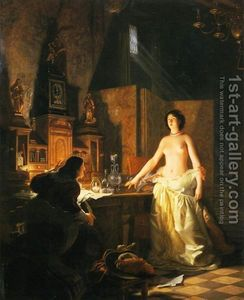
(Pictures, from top to bottom:
(1) Mademoiselle de Maupin, dressed as a male fencer, by Kirchneer
(2) Women training in a salle d'armes, with a Matre d'Armes on the left
(3) La Maupin ( and Luynes?) , painting by Delaroche ( I think)
SIDE STORIES, ANECDOTES AND CHARACTERS Part Two - THE TRUE STORY OF LA MAUPIN, ADVENTURESS, OPERA SINGER AND FENCING CHAMPION
By Lord Myron de Verne, 2010-11-02
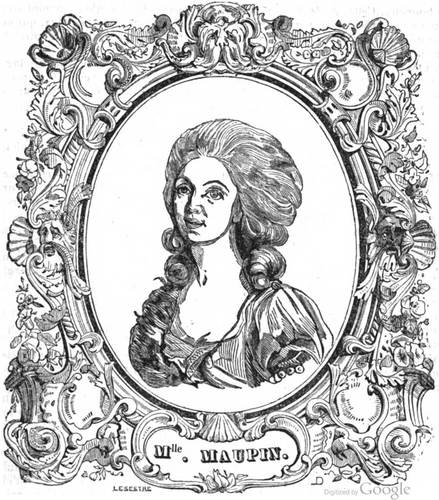
This story is dedicated to Comtesse Baharat Atlas, for the Opera section, and to Sophie Dalville, for the fencing section.
CHAPTER ONE :
It all begins under the reign of Louis XIV, in 17 th Century.
Louis de Lorraine- Harcourt, Comte dArmagnac, Comte de Charny, Comte de Brionne, Vicomte de Marsan, Chevalier of the Kings Order, Senechal of Burgundy, Governor of Anjou, is Grand Squire of France, Master of the Horse and Crown Equerry. He is one of the kingdoms four Grand Officers, and Louis XIV calls him Cousin, a privilege in itself!
Being in charge of the Royal Stables and horse breeding, his duties include, among many others, the education of young Nobles to become the Kings Pages.
Monsieur Gaston dAubigny (not a Noble), is the Comte dArmagnacs secretary, and the director of this Pages school, where they are taught manners of the Court, but mainly horse riding and fencing. Gaston dAubigny, a heavy drinker and addicted skirt chaser, has one daughter, Julie. She receives the same education as the Pages, quite unusual for a girl.
At age 15, she is by far the best fencer of them all and rides horses like a man. She has become a woman too, and her budding beauty, as well as her unusual skills and flamboyant personality, catch the eyes of the Comte dArmagnac. She becomes his mistress.
In order to hide this liaison behind a respectable faade, le Comte dArmagnac arranges the marriage of Julie with a certain Monsieur Maupin, an obscure civil servant, whom, by a strange occurrence (ahem...) is immediately summoned to service in a very distant part of the kingdom. Of course, Julie does not follow her husband, and stays with the Comte. He introduces her to Versailles, where she attends, at respectable distance according to her special status, to some ceremonies, and is invited to minor Salons.
In retrospect, we can guess she must have been in awe of the Courts splendour, and at the same time doubt that her fiery and free-wheeling temper could have been satisfied by such a strictly coded environment.
Eventually, the inevitable happens: le Comte and La Maupin become jaded, and estranged.
She stays in Paris, and being alone but married allows her more freedom than unmarried girls of her age. She lives a bohemian life between cabarets and salles darmes ( fencing arms rooms), where she challenges fencing amateurs and professionals, more than often winning. She turns wild sometimes, and is reported to have struck some shopkeepers, and quarrelled violently with young aristocrats in the streets. One day, in a salle darmes, she meets a professional fencer, a Beau named Srannes, and they fall in love.
Sharing their passion for each other and for fencing, they live at random like carefree youngsters for some time, until Srannes gets entangled in a bad case of a forbidden duel that caused someones death, under the porch of the Carmelites church.
The Paris Lieutenant- General of Police, the famous and most dreaded La Reynie, is determined to chase and find Srannes; the sentence for such an offence can be death or the galleys! The young couple, frightened, decides to flee Paris to Srannesbirth place, Marseilles, where he says he has friends and opportunities.
Arriving there, of course, friends turn their back on them, and opportunities fail to occur.
La Maupin has a grand idea: why not create a new cabaret act? She will dress as a man, and fence with Srannes, and during or between fights, they will act and sing songs! and this, they do...
Its an immediate success! People are stunned , not only by this novelty show, but also by this splendid and charismatic woman dressed as a man ,fencing like a champion, and singing beautifully like a girl...A mixed, ambiguous and disturbing feeling, between desire and scandal...Julie discovers that she enjoys causing such trouble and confusion in the minds and senses of men and women in the audience. When acting, she feels waves of fascination and hidden desire vibrating from the crowd unto her, and she enjoys so much being wrapped in them. From now on, she will sometimes wear mens clothes, in everyday life too, even walking in the streets in manly attire.
One day, someone in the audience suggests that she should attend the singing class at the Opera Academy of Marseilles. She is promptly auditioned by the Director, Pierre Gaultier, a friend of Lully, the great music composer.. She has no vocal technique yet, but an immense musical memory, an incredible stage presence and a dream voice of Bas-Dessus (as the mezzo-soprano voices were called in those days; some argue that La Maupins voice was rather a contralto voice, but alas! well never know. ) Gaultier falls under her spell. She enters the Academy of Music, and as she improves quickly, and learns the Repertoire at lightning speed, she is soon afterwards hired in the Opera House of Marseilles, under the stage name of Julie dAubigny, and begins her Opera Career.
( to be continued)
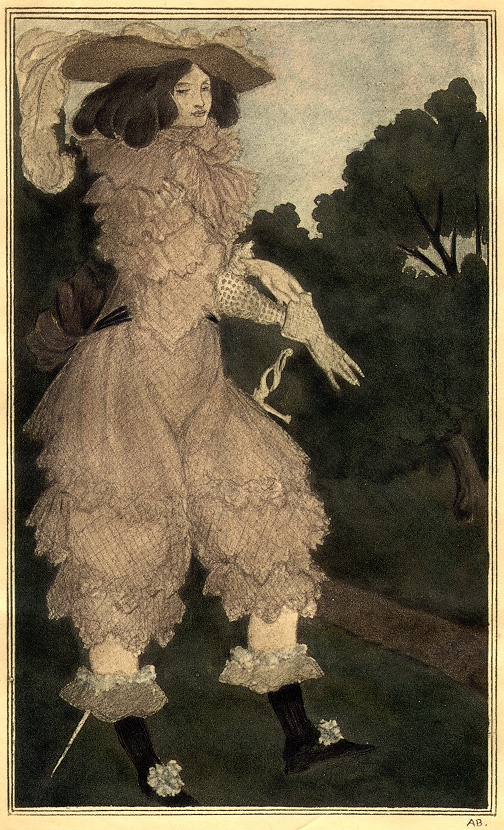
( pictures, from top to bottom: (1)a portrait of Mademoiselle de Maupin, probably by the end of her life
(2) Louis de Lorraine-Harcourt, Comte d'Armagnac, as a young man
(3) a "fancy" portrait of La Maupin in a fencing outfit, drawn by Aubrey Beardsley by the end of the 19th century.
My publisher abuses my modesty and eventually forces me to give an account of the prestigious critical acclaim received by my first story. So, here are a few samples:
" A new star arose in the firmament of Literature! I wish I could write like him! ( it would spare me a lot of thinking, hehe...)"
VOLTAIRE ( in a letter to Mme du Chatelet- sadly, she threw it in her dustbin.)
" I hate to say anything good about these darn Nobles, but I must admit this de Verne is the best ( but I don't know in what.)"
ROUSSEAU ( mumbling as he had his beard shaven, his Barber reported me)
" De Verne's stories? Magnifique! Fantastic! Flabbergasting! only bad thing is I can't read English"
DIDEROT ( translated from the French by Lady Candace)
" If I read the SIDE STORIES? Yessum, Ma'am! Now, this de Verne...he's my boy! "
LOUIS XV ( from a private conversation with La Du Barry).
All I can say is: Thanks for the encouragements, guys, you have such a good taste.
If the book is published on paper, all this will look great on the back cover, won't it?


